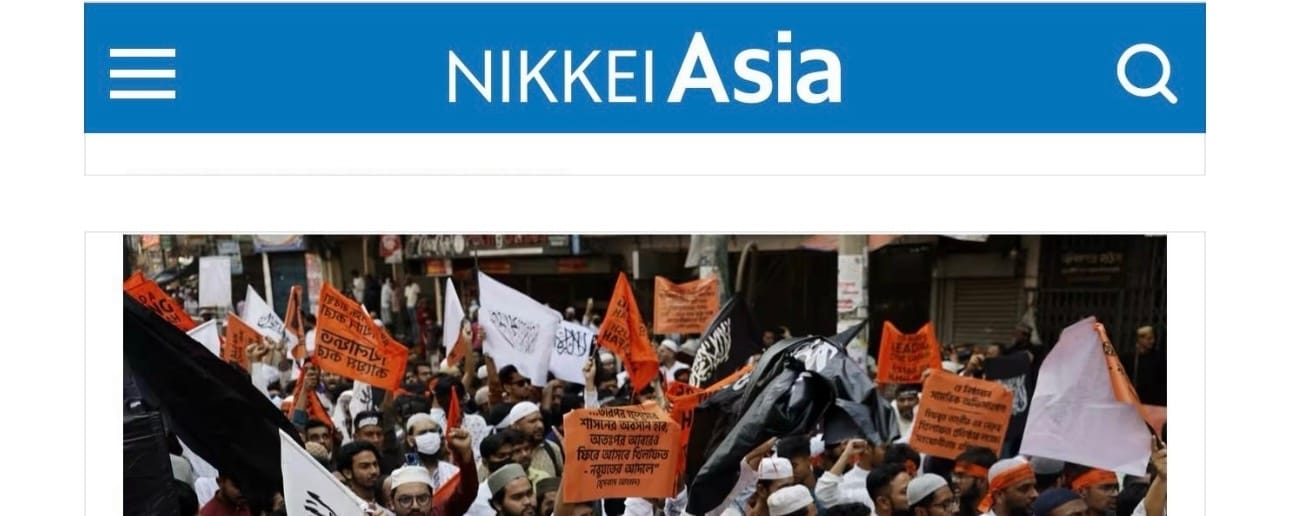Islamist Revival in Bangladesh as Law and Order Spirals Downward

Hardliners hit the streets as surging crime rates overwhelm interim government
DHAKA -- Hundreds of hardliners from the banned group Hizb ut-Tahrir streamed onto the streets of Bangladesh's capital Dhaka this month to call for an Islamic state ruled by religious law.
The Islamists clashed with police who responded with teargas and batons as they arrested about three dozen protesters. The rally exploded onto the streets despite activists calling beforehand to block this public show of force by a group blacklisted for its extremist ideology.
A resurgence among Islamist groups is raising concerns in this Muslim-majority nation of 171 million as its interim government struggles to manage a deteriorating law-and-order situation with murder, rape and other crimes on the rise.
"I am deeply alarmed by the resurgence of Hizb ut-Tahrir and firmly believe that the threats they pose must be taken very seriously," said Shafqat Munir, a senior research fellow at the Bangladesh Institute of Peace and Security Studies (BIPSS).
"Hizb ut-Tahrir was proscribed because it promotes extremist ideology that incites violence. It cannot operate openly, and all of its activities must be countered. This should be our national policy," he added.
This resurgence has also set off alarm bells in Washington and New Delhi over fears about destabilizing regional security in Bangladesh, sandwiched between India and civil-war wracked Myanmar.
The country -- which is gearing up for elections after the ouster of its Prime Minister Sheikh Hasina in a popular uprising last summer -- has grappled with Muslim extremism before, including a spate of grisly murders of atheist writers and other non-Muslims a decade ago.
In post-Hasina Bangladesh, cases of morals policing and harassment of women by hardline religious mobs are becoming a feature of public life. People are being called out for eating during the holy month of Ramadan, restaurants have been vandalized for staying open during daylight fasting hours while women are harassed for not wearing headscarves.
In the north of the country, mobs of hardliners recently vandalized football pitches that were to host girls' soccer matches, followed by streams of online abuse. In response, Dhaka was forced to pledge action to guarantee the girls' safety.
"The way people in our country are insulting us -- it is impossible for the girls to endure," said Sabina Khatun, captain of the country's national women's soccer team.
The harassment has even extended to well-known female actors who have reported abuse online and at work.
"Feeling insecure," leading Bangladeshi actor Pori Moni wrote in a January post on Facebook. "Why aren't we safe in this free country? What are they trying to prove in the name of religion?"
The resurgence of hardliners comes as Bangladesh is hit by rising crime, including rape and murder, while the police have long been eyed as an arm of Hasina's former government.
In the previous two months, at least 85 rape cases have been reported, up from 63 cases in January and February of last year, according to local rights organization Ain o Salish Kendra.
Public anger boiled over following the rape and murder of an eight-year-old girl this month, allegedly by a relative. In another case, the father of a rape victim was reportedly murdered for trying to file her case.
Enamul Haque Sagor, an assistant inspector general and spokesman for the Bangladesh police, said hardline groups are under "strict intelligence surveillance" while the number of street patrol officers has been increased.
"We have adopted proactive policing measures to combat violence against women," he added.
The government has vowed to take strong action against perpetrators of sexual violence and some arrests have been made.
However, security experts warn that the "ineffectiveness" of the government's approach is contributing to rising crime rates, and hardliner groups are filling the vacuum.
"Social disorder and rising crime rates are reflections of the interim government's, especially the home ministry's, failure to handle the situation with the required competence," said Saimum Parvez, a senior researcher at Norway's School of Theology, Religion and Society.
While some Islamists have been directly involved in crimes, including those against women, extremist organizations are capitalizing on the breakdown in law and order, Parvez said.
"The resurgence of these radical groups is not in response to the high crime rates; rather, the lawlessness has been creating a fertile ground for the resurgence," he added.
At least 119 people have lost their lives in mob violence in the seven months since the caretaker government took office, with 294 cases of murder nationwide in January, well up from 231 in the same month a year earlier, according to police data.
Earlier this month, a group of hardline Islamists attacked a Dhaka police station and demanded the release of a prisoner accused of harassing a local university student for not wearing a scarf. Two individuals, previously arrested on terrorism charges, were seen inciting the mob during the attack.
Some politicians have warned that social unrest could push back the timeline for fresh elections, despite growing calls for polls sooner than later.
"If the interim government continues its apathetic approach to addressing extremist organizations and ideologies, it risks creating an environment conducive to violent extremism," Parvez warned. "This issue is exacerbated by the presence of a caretaker government that lacks clear directives for transitioning power."
Masum Billah is a contributing writer.

Reply